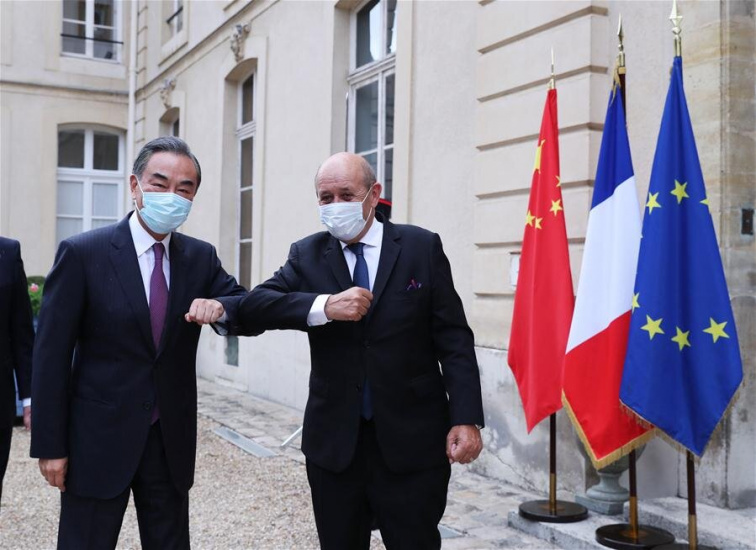China and France should safeguard Iran nuclear deal, Chinese FM says

In talks with French Foreign Minister Jean-Yves Le Drian, Wang said that upholding multilateralism is the biggest consensus reached during his trip to Europe, according to the Chinese People's Daily Online.
“Under such circumstances, China and France, as major responsible countries, should actively promote and practice multilateralism,” the Chinese daily quoted Wang as saying.
According to the daily, the Chinese foreign minister made a four-point proposal for China and France.
“First, China and France need to adhere to the concept of multilateralism…. Second, both sides should take multilateral actions…. Third, China and France should abide by multilateral agreements. Unilateralism, including irresponsible withdrawal from international organizations or violation of international agreements, is unpopular. China and France should strengthen coordination and cooperation on international affairs, and safeguard major outcomes of international agreements and multilateral diplomacy, such as the Iran nuclear deal. Fourth, the two sides should strengthen multilateral institutions. The United Nations is the most important platform for supporting and practicing multilateralism, and the two sides should support the United Nations in playing its due central role in international affairs,” the Chinese Daily said.
Wang made the remarks in a Saturday meeting with his French counterpart in Paris, amid heightened tensions between the U.S. and other parties to the JCPOA. China and France both are signatories to the Iran nuclear deal.
In a move to kill the deal, the U.S. triggered efforts to restore all UN sanctions on Iran on August 20. The U.S. submitted what it calls a “notification” to the UN Security Council calling for the re-imposition of UN sanctions on Iran despite fierce opposition from all remaining parties to the JCPOA. The deal’s parties rejected with one voice the U.S. push to trigger the snapback process, saying the U.S. lost its legal authority to initiate the process after it unilaterally withdrew from the JCPOA on May 8, 2018.
However, the U.S. keeps insisting that it has the right to restore the UN sanctions on Iran because it is mentioned as a “JCPOA participant state” in UN Security Council Resolution 2231.
In a tweet on Friday, Foreign Minister Mohammad Javad Zarif lambasted the U.S. administration for its insistence on triggering the snapback process, likening the U.S stance on Resolution 2231 to a husband who lost his privileges mentioned in the marriage certificate after he divorced his wife.
“After thrice being rejected by SC, U.S. now threatens ‘sanctioning anyone & any entity that comes between US’ & ‘its snapback.’ Obviously, they don't understand law or UN. Maybe they can grasp this: You divorced the JCPOA in 2018. Your name on the marriage certificate is irrelevant,” tweeted Zarif.
The foreign minister was responding to remarks by Kelly Crafts, the U.S. ambassador to the UN, who said that her country will sanction anyone opposes the U.S. push to restore the international sanctions on Iran.
“Full of lies”
Reacting to U.S. Secretary of State Mike Pompeo’s claim about the return of sanctions on Iran due to the activation of the trigger mechanism, China’s permanent mission to the United Nations called it “full of lies”.
China's Permanent Mission to the United Nations stated in a Twitter message, “U.S. claimed that whether or not a resolution to continue sanctions relief is introduced, sanctions on Iran will return. Full of LIES. U.S. is no longer a participant to JCPOA, and therefore ineligible to invoke the snapback. 13 UNSC members believe the snapback is not triggered.”
Pompeo previously wrote in a Twitter message that after the failure of the Security Council in its mission to maintain peace and security, the United States announced the 30-day return process of all UN sanctions against Iran.
According to Pompeo, the sanctions will return at midnight on September 20 (Shahrivar 30) Greenwich Mean Time.
Source: Tehran Times

